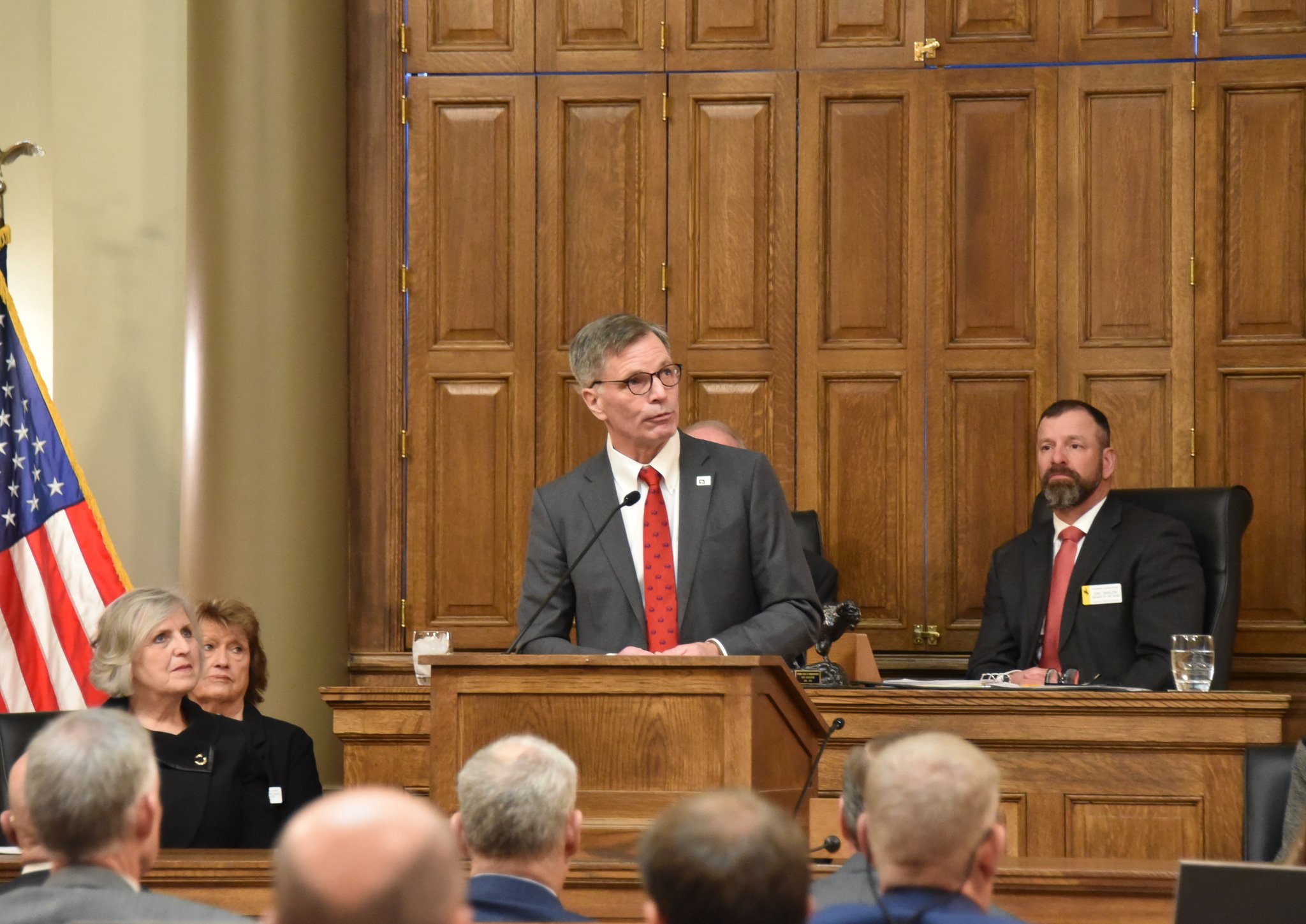Governor ratifies Wyoming’s First 24/7 Suicide Hotline
$2.1 million allocated for the hotline
March 16, 2022
In his State of the State address in February, Gov. Mark Gordon asks lawmakers to consider using one-time funds for a suicide hotline. Senate File 66, which includes $2.1 million to establish Wyoming's first 24/7 suicide hotline, is now law. (Courtesy of the Office of Governor Mark Gordon)
By Shen Wu Tan
Special to the Wyoming Truth
Wyoming will get its first 24/7 suicide hotline after funding for the much-needed service received its final stamp of approval.
Gov. Mark Gordon has signed Senate File 66, now a law authorizing one-time coronavirus relief funds for various projects, including the suicide hotline. The law sets aside $2.1 million in American Rescue Plan Act (ARPA) funds for around-the-clock suicide prevention services in a state that recorded the highest suicide rate in the nation in 2020, the latest figures from Centers for Disease Control and Prevention show. Data reveals the state that year had a suicide rate more than double the nationwide rate of 13.5 suicides per 100,000 people.
“The governor supported efforts to fund a suicide hotline 24/7, as it was in his initial ARPA budget proposals,” said Michael Pearlman, Gordon’s spokesperson. “While he initially proposed $7 million, he is pleased with the legislature's appropriation. That comes in conjunction with other health and human services investments in SF66 [Senate File 66]. He believes it is a good start to have that initial funding and that more work needs to be done.”
Wyoming was the only state without a suicide lifeline call center until 2020. The state legislature that year appropriated about $400,000 for two years to launch the state’s first suicide call center, which only runs certain hours. Before that, out-of-state suicide call centers picked up all calls from Wyoming.
“The most recent data showed that 47% of Wyoming's calls were being answered in-state, and we know that 24/7 coverage will increase the percentage of calls answered in-state,” said Donna Birkholz, a board member for the Wyoming chapter of the American Foundation for Suicide Prevention, a grassroots nonprofit with volunteers throughout the state. “Having coverage 24/7 means that callers will have shorter wait times - we know that the sooner someone can intervene during a call, the better. In-state response means that the person responding to the call has a good understanding of the unique challenges in Wyoming, whether that's winter roads affecting travel to care, or the rural nature of our communities. When a call is answered in-state, it facilitates the caller's access to services, and the center is able to call back and confirm that the caller is accessing those services.”
The state operates two local suicide hotlines for limited hours. The Central Wyoming Counseling Center has a suicide hotline open from 4 p.m. to midnight seven days a week, while the privately funded Wyoming Lifeline is open Monday to Friday from 4 a.m. to 4 p.m., according to Andi Summerville, executive director of the Wyoming Association of Mental Health & Substance Abuse Centers. The association is made up of twenty private, nonprofit centers throughout Wyoming that offer outpatient and residential mental health and substance abuse prevention and treatment services.
Wyoming reported a suicide rate of 30.6 deaths per 100,000 people in 2020, slightly higher than the 29.6 rate recorded the previous year, according to data from the Wyoming Department of Health. In 2020, 182 residents took their lives, mostly by firearms. The 2020 suicide rate trails the state’s 15-year high of 31.2 in 2012.
A person who calls Wyoming’s suicide hotlines outside of operating hours is redirected to call centers in other locations. Wyoming averages about 350 to 400 calls per month, Summerville said.
Jen Davis, Gordon’s policy advisor on health and human services, said the Wyoming Department of Health will be working on next steps to get the hotline up and operating.
The health department also has another $400,000 in its approved standard budget for suicide hotline operations.
Kim Deti, spokesperson for the Wyoming Department of Health, said there would be a bid process and a contract for services based on available funding for hotline operations. More details for setting up the 24/7 suicide hotline are unknown at this time, she added.
Wyoming has certainly had “historically high suicide rates,” Deti said, noting a variety of factors, such as high firearm ownership rate per capita, social isolation, socioeconomic status and the cultural stigma around mental health.
Birkholz of the American Foundation for Suicide Prevention said, “Most people who are struggling with suicide can go on to live happy, productive lives. When someone dies by suicide, their family, friends, coworkers, and community lose someone who would have been a positive part of their lives going forward.”
The Wyoming Truth is a nonpartisan, nonprofit news operation dedicated to helping the community and fighting for the rights of local citizens. To sign up for a free subscription, or to make a donation, please go to www.wyomingtruth.org. Other media outlets are free to run this article as long as they credit the “Wyoming Truth” and link to our website, wyomingtruth.org. If you have any tips about this issue or others, or for more information about the Wyoming Truth, contact us at info@wyomingtruth.org.


